Despite being the richest man who ever lived, richer than Michael Jordan, Christian Renaldo, and Elon Musk combined, King Musa yearned for the one thing he could not buy … his salvation. As the ruler of the Malian Empire, in the African Sahel, Mansa Musa, or King Musa, as he is known in English, rose to become the richest man in human history during his rule. Yet, no matter the level of his empire’s reserves of gold and salt, two of the most sought after commodities, he had to journey to Mecca to complete his final step to salvation. As a Muslim, Islam commends each faithful to complete the 5 pillars of core beliefs and practices, the ultimate one being the Hajj, a pilgrimage to the city of Mecca.1
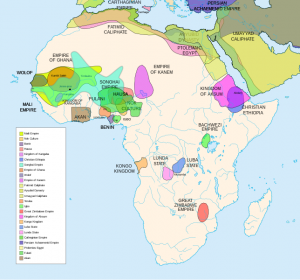
The ninth Emperor of Mali, Mansa Musa, was Sundiata’s great-grandnephew. Mansa, an honorific title compares to European terms such as “highness” or “excellence.”2 He belonged to the renowned Keita clan, a group of people who dominated the Empire of West Africa from 1250 for about two centuries. The Mali was the first significant Islamic state in West Africa, and by Mansa Musa’s time, the Keita Dynasty had largely converted to Islam. The main source of income for Mali was the export of gold through the Sahara to trading posts around the Mediterranean Sea. European dynasties of bankers and princes traded other riches for the gold and salt, along with Mansa Musa and his Keita extended family, all contributed to the medieval economic boom in the Mediterranean region. The gold trade eventually became a state monopoly in Mali, and the money generated from it undoubtedly played a crucial role in the empire’s ability to grow and unite.3
His great successes surpassed his wealth, King Musa strongly promoted the growth of Islamic educational institutions and promoted places of worship in Islam. His ambitions included a drive to build mosques all over his realm. Theologians, geographers, mathematicians, historians, and scientists congregated around the Sankore Mosque in Timbuktu to form a group that published works long into the eighteenth century. Muslim scholars gathered around mosques in the same way that Christian philosophers did around cathedrals, and Sankore was one of the best, with fame extending as far as Egypt and Morocco.4 Having lived faithfully all throughout his life, would King Musa survive a trip all the way to the Arabic peninsula when his empire extended through most of Western Africa? To successfully accomplish his hajj he would need to traverse through what is today’s Libya, Egypt, Israel and turn downward towards Mecca in Saudi Arabia.
I want to delve into the many contributions of the 10th King of Mali, Mansa Musa; how he came to power, the goals he set for himself at the beginning of his reign, how he developed himself and his empire into what they were, his infamous pilgrimage to Mecca, and the intellectual wealth and innovative minds of Africans. In the 14th century historians describe Europe as slowly awaking from its dark ages but all too often avoid examining the wealth of ideas, riches, and human innovations that African Civilizations produced. This article will take us on the path of the richest man to ever live, King Musa or Mansa Musa, who acceded power in 1307 and ruled until 1337.5
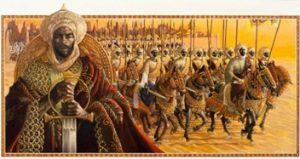
We begin our story when King Musa rose to power. Following the disappearance at sea of the previous monarch, Abu Bakr II, in 1312 CE, Mansa Musa assumed the throne. In order to explore the Atlantic Ocean, Mansa Abu Bakr II had sailed off with most of his ships, but he never made it back. The Malian Empire was already a very prosperous kingdom in Africa; yet, when Mansa Musa inherited this wealth, he worked tirelessly to increase it. Mansa Musa led by example and wanted to amass riches not to keep them but to praise and honor God’s through giving alms, and by building Madrassas to study Islam and Mosques to pray. King Musa was able to fund his Hajj and everything else necessary to accomplish this journey because he ruled over such a prosperous empire whose wealth came primarily from mining gold, the extraction of salt, and trading ivory from elephant tusks.6 He also held major gold mines in West Africa in addition to salt and copper mines. Musa was one of the richest monarchs in history because he had the gold monopoly. Because of this, he had the means to maintain a huge army, which he then used to extend the empire by seizing new territory. Under Mansa Musa’s administration, Mali was a sizable nation that spanned from the Atlantic Ocean in the west to the Niger River in the east, as well as, from the Wangara gold mines in the south to the Taghaza salt mines in the north.
Musa made the decision to travel to Mecca for the hajj, the sacred pilgrimage, in modern-day Saudi Arabia which all physically capable Muslims who have the financial means to do so are required to perform at least once in their lifetimes. Musa’s reign saw fewer monarchs like himself making the trek, but Musa wished to uphold the principles of his religion. The Islamic faith is built around five pillars, or core principles. Proclaiming one’s beliefs, the five daily prayers, zakat, or almsgiving, the Ramadan fast, and lastly the hajj, or journey to Mecca in Saudi Arabia. It is crucial to finish all of the pillars in that specific order, as King Musa did.7 Early in his life, he expressed his Islamic beliefs, which was then followed by the five daily prayers. Muslims in Mecca, Saudi Arabia, pray toward the Holy Kaaba, a black, cube-shaped building located inside Mecca’s Great Mosque, as a sign of their dedication to their religion. He donated alms in the form of charity, and built mosques and schools during his entire hajj to Mecca. King Musa wished that by going on the pilgrimage, he would also gain more knowledge of Islam and discover teachers who would help him spread the Islamic faith throughout his empire. With a massive entourage of courtiers, slaves, and warriors, Mansa Musa set out from his kingdom’s recently conquered territory, which included the important trading center of Gao. He traveled for about 4,000 kilometers, or roughly 2,485.5 miles, across the arid, hot, and exhausting Sahara Desert before reaching his final destination in Cairo, Egypt. According to the narrative recorded by the scholar Shihab al-‘Umari roughly 10 years after King Musa’s pilgrimage, the emperor and his enormous entourage traveled from 1324-1325.
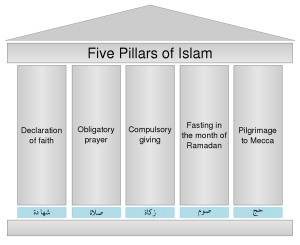
Mansa Musa is claimed to have traveled with tens of thousands of people, including slaves, soldiers, and government officials.8
Since robbery groups frequently traveled these “highways,” safety was an issue. Due to the fact it included oases along the way, the longer route was frequently preferred to one that was more direct. Thousands of pounds of gold had to be collected, and camels were used to deliver it. The camels could travel up to 20 kilometers per day and carry weights of up to 500 pounds while going without food and water for several days. This spectacular adventure created an effect on everyone who witnessed it thanks to exotic animals, and individuals from various walks of life. The splendor of this parade has been attested to by numerous accounts from diverse regions.
As Musa arrived in Egypt, according to writings by the ancient historian Shihab al-Umari, a servant of al-Nasir welcomed Musa in Cairo, and invited him to visit the other king. With some reluctance, Musa turned down the offer, saying he was simply passing through on his way to Mecca, which allowed him to fully exhibit his nature. His reluctance to meet the king, soon was understood. According to the records, a man by the name of emir Abu remarked, “I recognized that the audience was revolting to him, because he would be required to kiss the ground and the sultan’s hand. The sultan’s protocol required that I bring him into the royal presence, so I persisted in asking him until he agreed despite his continuous reasons.” When Musa decided not to kiss the sultan’s feet, the encounter became tense. Al-Nasir was only fully welcomed after Musa made that decision. Al-Nasir supplied shelter to Musa and everyone traveling with him after the two men had a talk, and Musa in return left a portion of his incredible fortune in Egypt.9 He left a lasting effect on the Mamluk administration, who took note of his knowledge of the Quran and his strict adherence to the timing of prayers. Musa was undoubtedly a devoted Muslim. Musa’s tremendous fortune created several unforeseen repercussions when he was in Egypt. He presented gold gifts to officials, the underprivileged, academics, and many other people. Egypt’s economy was effectively destroyed when the price of gold fell according to the laws of supply and demand. When Ibn Battuta, a renowned scholar, visited Cairo a decade later, he observed that the economy still hadn’t fully recovered from Mansa Musa’s visit. The impact Mansa Musa’s visit had on Egypt perfectly illustrates the Mali Empire’s dominance and richness, even when it came into contact with distant lands.
The economy stabilized, partly when Mansa Musa started borrowing from Cairo-based institutions, despite the high-interest rate, in order to undertake many projects to give prominence to God in his Empire according to Islamic Law. The king’s visit, though, wasn’t just about giving alms. He expanded his domain along the Niger River and the southern edge of the Sahara Desert after acquiring the kingdom of Songhai’s Gao area. He would later posses an empire that included Mali as well as the modern-day nations of Senegal, Gambia, Guinea, Niger, Nigeria, Chad, and Mauritania.10 At that time, the king virtually ruled the Mediterranean region’s gold market alone. Gao would, however, hold a particular place in the king’s heart. After completing his Hajj, Musa would settle in this region, which was now a part of Mali. The wealthy king also considered Timbuktu to be a significant city, investing his fortune in the construction of mosques, colleges, institutions, and schools there. The Djinguereber Mosque, a famous structure made of mudbrick and wood that has weathered the test of time and been operational for more than 500 years, was commissioned by Musa in the booming commerce center. Only after Musa’s pilgrimage to Mecca did word of his wealth and authority leave Africa.
Today, historians, who examine records from the period, consider Mansa Musa’s legacy the richest empire ever. Not only because of the amounts of gold and precious minerals he accumulated, but especially for how he used his wealth. Mansa Musa left a legacy that gives “the fictitious Black Panther a run for his money”, from the quantity of natural resources he developed to the expansion and development of the towns he left behind.11 Musa’s fortune throughout his lifetime has remained extremely difficult to measure in terms of today’s value. Even though his riches were labelled “indescribable,” he was obviously motivated by his faith to give alms to others and to invest in Mosques and institutions of higher learning. Mansa Musa focused his efforts on the cities in his empire to democratize education when he came back to Mecca. In cities, like Gao and most notably, Timbuktu, he erected mosques and other public structures. Mansa Musa’s innovations led to Timbuktu’s development throughout the 14th century into the earliest and most significant Islamic academic hub in the world. Mansa Musa expanded the fame of the Malian Kingdom by recruiting academics and architects from all over the Islamic world during the time he journeyed for his Hajj. Around the same time, the Malian Kingdom expanded to its fullest potential and became a thriving, prosperous nation under Mansa Musa’s rule. After King Musa passed away in 1337, his sons inherited the wealth and titles. By 1337, his astute leadership had resulted in the most prosperous empire. However, overtime this prosperity came under attack by neighboring kingdoms whose rulers coveted King Mansa Musa’s fame and favor from God. Eventually, the empire completely crumbled. Today’s historians and history savvy students view Mansa Musa as a representation of extravagant wealth and his empire as the first intellectual university center in sub-Saharan Africa. However, his wealth is not the only aspect of his notoriety, he is also renowned for his giving birth to Mali’s Islamic arts scene and cultural traditions by having fostered his empire’s expansion and economic development based on education, faith, and worship, as evidenced by his dedicated commitment to Islam’s 5 pillars.
Most importantly, historians explain that the wealth and advances of King Mansa Musa and his empire’s legacies have been conveniently lost to the misleading narratives of colonialists who self described as bringing light, faith, and civilization to the the “dark African Continent”. In his book, Born in Blackness: Africa, African, and the Making of the Modern World, Howard French provides several sources of very strong evidence to support his claims that not only did Europeans build their wealth on the slave trade and on the pillaging of gold, slat, natural minerals, and countless cash crops, but also denied the reality of their educational, intellectual, spiritual, developments, innovations, and cultural prominence.12 In his assessment of recent scholarship, Versi explains the motivations and the importance of having obfuscated such large periods of African history to justify and promote colonization and its abhorrent abuses.13 French demonstrates in great detail of how “the labor, of the enslaved Africans and the enormous machinery that had arisen to capture them from Africa, transport them to the New World, and work them to the bone” on the plantations that drove the economies of the West – and their constant wars and feuding over control of the trade marked that era. French demonstrates with great detailed evidence that “the labor of the enslaved Africans and the enormous machinery that has arisen to capture them from Africa, transport them to the New World, and ‘work them to the bone’ on the plantations that drove the economies of the West – and their constant wars and feuding over control of the trade that marked the era.”14
https://www.islamicity.org/80076/mansa-musa-the-richest-person-who-ever-lived/
- Musharraf Hussain, The Five Pillars of Islam: Laying the Foundations of Divine Love and Service to Humanity (Markfield: Kube Publishing Ltd, 2012), 1. ↵
- Stephen Atalebe, “Mansa Musa, the Hero.” New African, no 502, (January 2011), 65. ↵
- Stephen Atalebe, “Mansa Musa, the Hero.” New African, no 502, (January 2011), 65. ↵
- John Coleman de Graft-Johnson, Musa I of Mali: Emperor of Mali, (Encyclopedia Britannica), 1. ↵
- National Geographic Society, Mansa Musa (Musa I of Mali) was the King of the Ancient Empire of Mali in West Africa, (National Geographic Society), 1. ↵
- National Geographic Society, Mansa Musa (Musa I of Mali) was the King of the Ancient Empire of Mali in West Africa, (National Geographic Society), 1. ↵
- Musharraf Hussain, The Five Pillars of Islam: Laying the Foundations of Divine Love and Service to Humanity (Markfield: Kube Publishing Ltd, 2012) 1. ↵
- Thaddeus Morgan, “This 14th Century African Emperor Remains the richest person in history“, History.com, (A&E Television Networks, LLC), 1. ↵
- “The Epic Pilgrimage of a Malian King,” Egypt Today: the Magazine of Egypt, 1, https://www.egypttoday.com/Article/6/17618/The-epic-pilgrimige-of-a-Malian-king . ↵
- “The Epic Pilgrimage of a Malian King,” Egypt Today: the Magazine of Egypt, 1, https://www.egypttoday.com/Article/6/17618/The-epic-pilgrimige-of-a-Malian-king . ↵
- Thaddeus Morgan, “This 14th Century African Emperor Remains the richest person in history“, History.com, (A&E Television Networks, LLC), 1. ↵
- Howard W. French, Born in Blackness: Africa, Africans, and the Making of the Modern World, 1471 to the Second World War, (Liveright Publishing Corporation) 2021. ↵
- Anver Versi, “The African Foundations of the West’s Wealth,” New African, May 2020, 18. ↵
- Anver Versi, “The African Foundations of the West’s Wealth,” New African, May 2020, 20. ↵
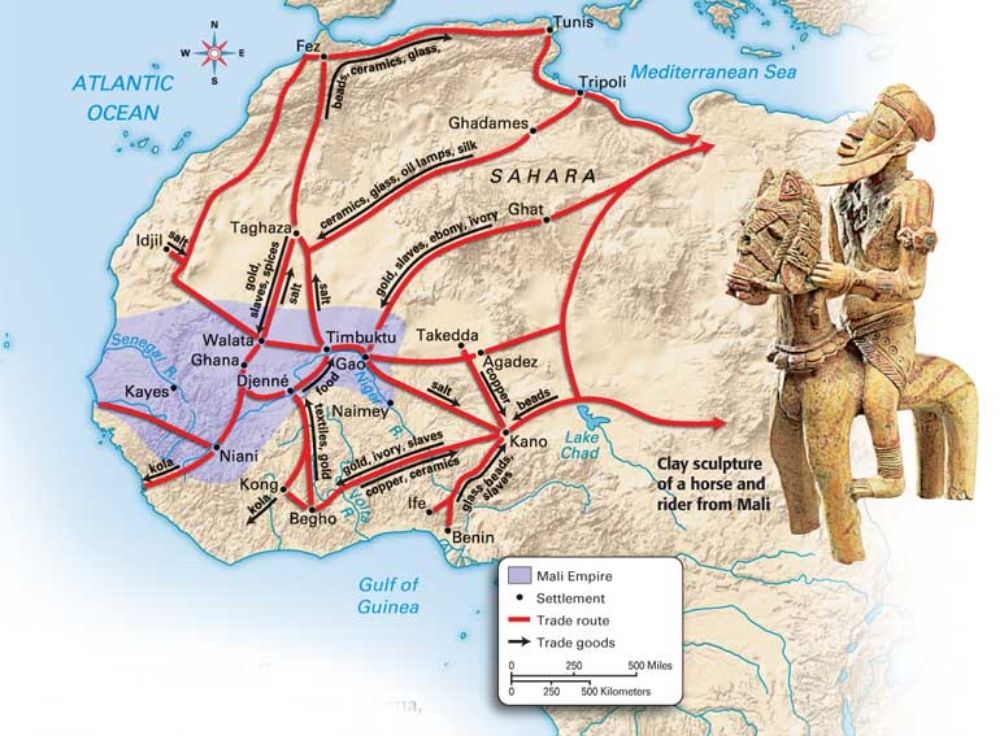

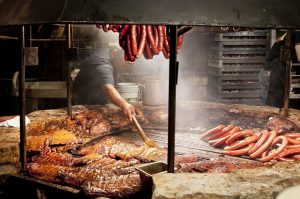
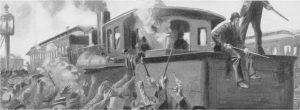
33 comments
ramaya2
This article is well researched, and its strengths lie in its historical depth, narrative and commitment to correcting misconceptions about African history. It addresses economic security, cultural security, geopolitical security and historical narrative. The most compelling part of the article to me was the discussion of Mansa Musa’s empire where Mali’s successors struggled to maintain stability that led to its collapse because of pressure from rival powers. It was also interesting to learn that Mansa Musa’s deep religious devotion shaped his leadership. One form of feedback would be to clarify the central thesis to focus on Mansa Musa’s economic impact or religion devotion.
Carollann Serafin
I think this article is very detailed and appreciate how I learned about someone that I never even knew. King Musa of Mali is talked about in this article and goes into the life that he lived all the way up until his passing. We learn that he was a man dedicated to God and all that he did was to serve the higher up. We also learn that although he was a higher up wealthy man we see courage and compassion come from him. I also love how you included popular stars today at the start of the article instead of going straight away to the topic of the article.
Lashanna Hill
King’s Musa’s life was very interesting along with the facts from his early days, to his pilgrimage, the contributions he made before and after and ultimately his death. His actions were the embodiment of the five pillars of Islam; declaration of faith, prayer, almsgiving, fasting, and pilgrimage. It made sense why he was reluctant and avoided certain invitations and encounters while on his journey that could interfere with growth in fulfillment that contradicts countless colonizers’ narratives.
setter
Dallasstar – thank you for an excellent article detailing the story of Mansa Musa, who is widely forgotten in the West. I was reminded of how we often call that period of time the “dark ages,” and speak pejoratively about the lack of progress and literacy during that time. But that view does not take into account what was happening in the rest of the world, including how great developers, innovators, and leaders were building their kingdoms, such as Mansa Musa. Thank you for enriching our view of this region with by introducing new figures and histories.
mortiz39
This article beautifully highlights the economic, educational, and cultural achievements of Mansa Musa’s Mali Empire, offering a much-needed lens on African security through wealth, faith, and intellectual leadership. The exploration of his pilgrimage and its geopolitical impact was compelling. Consider expanding on the empire’s military strategies and internal stability to further enrich the narrative.
adelao4
First, I have to point out that you write with great detail. I hadn’t heard of King Musa of Mali before, but I’m not surprised. I appreciated how you highlighted current big and influential names in pop culture while pointing out that King Musa was far more powerful and influential than all of them combined yet his story remains largely unknown. He was a pioneer for his community, and his legacy still holds significance today.
ejuarez8
One interesting feature was the explanation of how Mansa Musa’s distribution of gold unintentionally caused inflation in the areas he visited. A provocative lesson in economics and government, this detail demonstrates how wealth can have unforeseen consequences if it is not managed correctly. Together with historical insight, the article’s vivid storytelling maintained it interesting and educational. The article would benefit from a somewhat more thorough examination of Mansa Musa’s enduring influence outside of his trip, according to constructive criticism. How, for instance, did his riches support Mali’s architectural and intellectual achievements, such as the renowned University of Sankore in Timbuktu? The article might be improved by including more information about his lasting influence in West Africa. All things considered, this was a perceptive and captivating book that effectively illustrated the historical significance of Mansa Musa!
lbofinger
Very informing Dallastar! I think you really got across how indescribably rich Musas was and how even with his fortune, he chose to give to others and invest in education. He is a inspiration for other wealthy people in todays society.
enorwood
This article was very informative and different from what I was expected! From the title and first sentence I thought that Mansa Musa might have been a morally complex person that struggled to repent for his sins; thus yearning for salvation that could not be achieved. So it was surprising that there was no twist and this ruler seemed like a genuine person dedicated to spreading education of his religion and being a faithful practioner. I also appreciated the clarification about misleading narratives at the end. Africa was not a dark continent prior to colonization and Mansa Musa seems like a testament to that.
cravagnani1
Hello! Your article is fascinating. For many of us who did not know about the history of King Musa, this is very enlightening and represents a significant part of African history and culture. Personally, I appreciate your detailed introduction as it sets the ground for the more detailed part of the article. King Musa’s reign was marked by prosperity, the flourishing of art, and education. Until this day he is considered one of the richest men to ever lived. What an interesting story, I can say that I learned a lot from your well-written article!